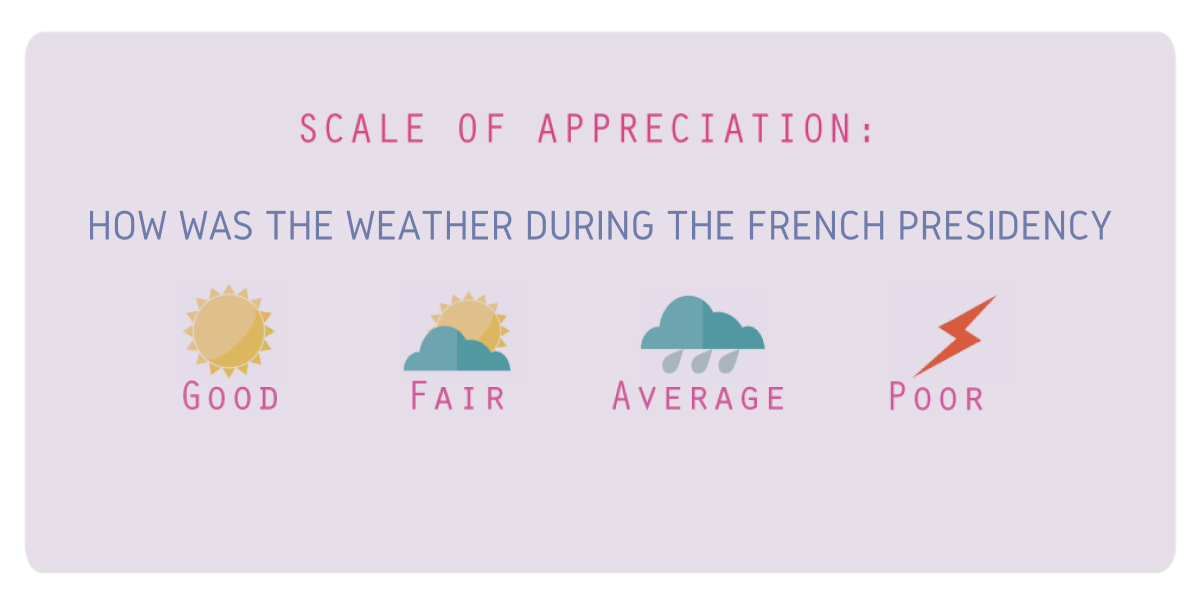MHE Publishes French EU Presidency Scorecard (January-June 2022)

Mental Health & Human Rights
To engage with and analyse the performance of the rotating Presidency of the Council of the European Union (EU), Mental Health Europe has devised a scorecard system through which we evaluate each Presidency’s commitment to and promotion of mental health. The performance of each Presidency is rated based on the following criteria:
- Promotion of mental health and well-being;
- Commitment to the rights of persons with psychosocial disabilities;
- The involvement and empowerment of users of mental health services.
Introduction
The French Presidency focused its priorities on five main areas: ecological transition, digital issues, social issues, defence and economic issues. Its priorities and programme were developed in cooperation with all EU institutions as well as the previous Slovenian Presidency and the upcoming Swedish Presidency.
Prior to its Presidency, the French government organised a Summit on Mental Health in October 2021, laying the ground for its commitment to strengthen international efforts that support mental health, promote respect for rights and foster worldwide innovative experiences. Following this event, two Ministerial Conference had been scheduled to take place during the Presidency: one on mental health and one on disability.
Promotion of mental health and well-being (GOOD)
Within the framework of its Presidency, the French government organised two conferences of relevance for mental health and well-being.
On 7th and 8th February, the “Sports and Sustainable Development Goals in Childhood: Societal issues regarding appropriate physical activities” conference took place at UNESCO’s headquarters in Paris. Although mental health was not the focus of the event, this topic was featured throughout the discussions. In his opening remarks, Mr Xing Qu, UNESCO Deputy Director General, reiterated the many benefits of practicing sport from an early age, notably to improve physical and mental health as well as general wellbeing. Subsequent discussions emphasised the drastic levels that physical inactivity among children have reached, with a subsequent increase in experiences of mental ill health being reported among youth. The link between physical activity and mental health was also reiterated in the Council Conclusions on “Sport and physical activity, a promising lever to transform behaviour for sustainable development”.
On 14th and 15th March, the Ministerial Conference on the Mental Health of Vulnerable Young People allowed for EU health ministers, professional and civil society experts in mental health to meet and discuss the political and financial means that can be used to improve the mental health needs of vulnerable young throughout Europe. In her intervention, Commissioner Kyriakides, confirmed the Commission’s commitment to mental health and shared recommendations on the prioritisation of mental health following the war in Ukraine.
Commitment to the rights of persons with psychosocial disabilities (FAIR)
On 9th March, the French Presidency held the Ministerial Conference on disability: Improving accessibility and access to rights, and implementing the 2021-2030 EU strategy. The aim of this event was to discuss the means of action to further improve accessibility and access to rights, in particular through inclusive education and a more inclusive labour market. It also created momentum to discuss the implementation of the EU Strategy for the rights of persons with disabilities 2021 and its flagship initiatives for 2022, such as the Employment Package whose discussions continued in the Disability Platform.
In the Council Conclusions on a European strategy empowering higher education institutions for the future of Europe there is a mention of the importance of such actors in the support and promotion of equal opportunities, including for persons with disabilities. Similarly, the document also specifies the need to support higher education institutions to ensure “the well-being of all in keeping with greater social diversity” and in reaching out “to under-represented groups in order to improve their access to higher education and help them to complete their studies” particularly for those who have been strongly impacted by the pandemic as well as those from rural and remote areas.
The involvement and empowerment of users of mental health services (FAIR)
The two Ministerial Conferences dedicated to mental health and disability included people with lived experiences of mental ill health as well as organisations representing people with disabilities in their programmes. MHE appreciates the efforts and commitment of the French Presidency to bring mental health and disability at the forefront of discussions in the EU agenda, including by involving experts by experience and organisations of people with disabilities as speakers.
We hope that, for future Presidencies and future activities of the Council, these efforts and commitments will not only be limited to the possibility to speak at events but also to the overall organisation and delivery of activities, which could take a full a co-creation approach to ensure that experts by experience are meaningfully involved throughout the process.
Moreover, more action could have been done to cover and discuss the intersectionality between mental health and other topics (e.g. ethnicity, gender, age, socio-economic status, etc.) or address the specific needs and barriers faced by persons with invisible disabilities, including persons with psychosocial disabilities.
Conclusion
Overall, the French Presidency maintained its set commitments to mental health and the rights of persons with disabilities by making these topics the centre of two Ministerial Conferences. Both events were part of the ongoing discussions at the European level on how to address mental health and the barriers for inclusion faced by persons with disabilities. They also included persons with lived experiences and organisations of persons with disabilities among their speakers, although neither was organised and delivered following a co-creation approach.
On a less positive note, while some of the Council Conclusions mentioned well-being and mental health, no Conclusion was specifically dedicated to mental health or disability, which MHE considers as a lost opportunity to translate the outcomes of some activities into more long-term commitments to be followed-up in the future.
Stay connected
Get our latest news, personal stories, research articles, and job opportunities.

